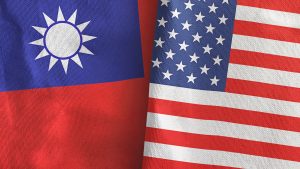For decades, the United States has been a steadfast partner to Taiwan, providing diplomatic, economic, and military support to ensure the island’s autonomy, security, and prosperity are safeguarded in the face of growing threats from Beijing. This partnership has been a cornerstone of peace and stability in the Indo-Pacific. Ensuring that Taiwan remains free from outside coercion remains a paramount U.S. national interest.
But today, the strength of this relationship is being tested, not by a lack of goodwill, but by shifting perceptions in Washington and a growing sense of urgency about the military balance across the Taiwan Strait.
Like great powers throughout history, the United States undergoes cyclical fatigue with its overseas commitments. After three decades of global overcommitment, Americans are increasingly questioning the cost and necessity of seemingly distant obligations. This fatigue is compounded by a growing perception that Taiwan, compared to other frontline states like Ukraine and Israel, is not sufficiently serious about its own defense. Fair or not, this perception is a dangerous undercurrent that threatens to erode bipartisan support in Washington, including in a Republican Party traditionally committed to Taiwan’s defense. For Taiwan to remain a U.S. priority, it must address this skepticism head-on and tangibly demonstrate it is willing to bear the burdens of its own security.
This perception stems significantly from Taiwan’s domestic politics, particularly the approach of the principal opposition party, the Kuomintang (KMT). The KMT’s insistence earlier this year on slow rolling defense spending increases, by instituting freezes on certain programs, politicized an issue that should be a strong point for unity. National Taiwanese reluctance to prioritize adequate defense spending has raised concerns in Washington. The KMT must recognize that defense spending is not a luxury but a necessity, and its hesitation risks signaling to adversaries and allies that Taiwan is not fully committed to its own survival. It also risks fundamentally undermining U.S. support for Taiwan’s defense over the long term.
At the same time, China’s military modernization has dramatically shifted the military balance across the Taiwan Strait. The People’s Liberation Army has invested heavily in advanced weaponry, cyber capabilities, and naval power. Taiwan’s defense spending, though increasing in recent years, remains woefully insufficient to counter this growing threat. Last year, Taiwan’s defense budget was approximately $19 billion, or roughly 2.5 percent of GDP. In contrast, China’s defense budget is almost $240 billion, with a focus on capabilities that directly threaten Taiwan, like amphibious landing craft and weapons vital to China’s anti-access/area denial strategy. This disparity is not just a matter of numbers; it signals to the world that Taiwan is not keeping pace, and acts as a form of political warfare on Beijing’s behalf.
Defense spending isn’t just about dollars spent; it’s also how they’re spent. Taiwan must invest in asymmetric capabilities, like drones, air defenses, and anti-ship missiles, to deter China’s overwhelming conventional forces. At the same time, it must modernize its aging military hardware, enhance and extend training for its reservists, address its manpower retention problems, and fortify critical infrastructure against cyberattacks and blockades, which were identified in Taiwan’s Quadrennial Defense Review as persistent issues.
These steps are not optional; they are the bare minimum to demonstrate to the United States, across the political spectrum, that Taiwan is a credible partner capable of holding the line. Without a clear commitment to closing the military gap, Taiwan risks being seen as a liability rather than an asset in Washington’s strategic calculus.
The sobering reality is that there is a growing feeling in some U.S. circles that the military balance has tipped so far in China’s favor that neither Taiwan nor the U.S. can realistically counter it. This perception is dangerous because it breeds defeatism and encourages miscalculation by Beijing. Analysts point to China’s numerical superiority in ships, aircraft, and missiles, as well as its ability to sustain a prolonged campaign, and question whether Taiwan can hold out long enough for U.S. forces to intervene effectively.
Time is running out to reverse this trajectory. Every year, the gap widens, and American patience wears thinner. Action by both the U.S. and Taiwan will be required to meet the military moment but also to uphold political legitimacy.
Taiwan’s domestic concerns cannot serve as a reasonable excuse for neglecting an existential issue. Economic challenges, political polarization, and social debates are real but pale in comparison to the threat of a Chinese invasion or blockade. Taiwan’s leaders must clearly communicate this reality to their people and rally public support for increased defense spending and preparedness, or accept a steady diminution of U.S. commitment.
The United States has its own domestic pressures to contend with. The bipartisan consensus that has long underpinned support for Taiwan is not guaranteed to hold indefinitely. In the Republican Party, there are voices rightly questioning the wisdom of committing resources to distant conflicts not core to our national interests. On the Democratic side, support for Taiwan is often tempered by a focus on avoiding escalation with Beijing. Taiwan cannot assume that either party will remain indefinitely committed to its defense for reasons of history or tradition. Political winds can shift, and Taiwan must act now to solidify its standing as a worthy partner, and to justify its current standing as a core geopolitical interest of the United States.
To secure Washington’s continued support, Taiwan must significantly increase defense spending, aiming for at least 5 percent of GDP in coming years, and prioritize asymmetric and defensive capabilities that maximize cross-strait deterrence. It must also foster bipartisan unity on defense policy, setting aside partisan differences to present a united consensus and engage in public diplomacy to reassure the U.S. and its citizens that it is serious about its security. Only then will it be safe to assume that U.S. support for this vital partner can be maintained for the long term.

































